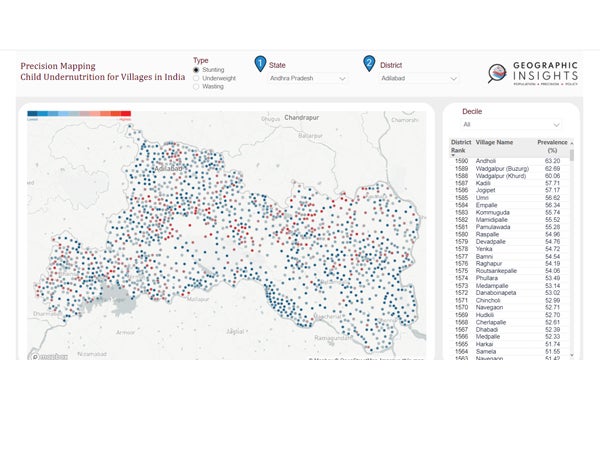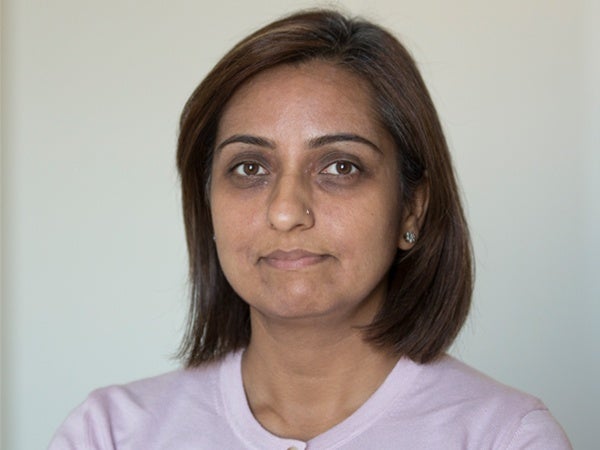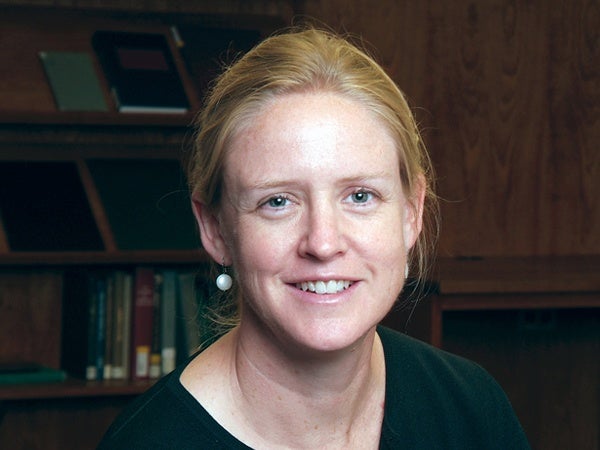Harvard Sloan Fellow on Aging and Work, Sung S. Park, PhD, shares findings of her study published in The Journals of Gerontology on the differences in mental and physical health among non-caregivers, short-term caregivers, and long-term caregivers during the COVID-19 pandemic in this New York Times piece.
First study to map child undernutrition in India by village shows greatest variation at these micro levels
A study published in PNAS by Harvard Pop Center Visiting Scientist Rockli Kim, ScD, faculty member S V Subramanian, PhD, and colleagues that utilizes “state-of-the-art data science techniques” to map and predict child undernutrition across the nearly 600,000 villages in India now provides governments at the most local level with this critical information about their constituents. To learn more about the potential value of such breakthrough, precision mapping, read the…
Study aims to advance prevention of HIV/AIDS among young women in low- and middle-income countries
Two researchers affiliated with the Harvard Pop Center (Chungling Lu, PhD, and S V Subramanian, PhD) and their colleagues assessed levels of knowledge of HIV/AIDS and associated socioeconomic disparities among young women between the ages of 15-24 using Demographic Health Surveys from 51 low- and middle-income countries completed between 2002–2018. Their findings, published in JAMA Network Open, point to there being a need to increase knowledge of HIV/AIDS across this…
Children with complicated births found to be at increased risk of eviction
A study finds that babies who were low-birth weight, experienced a lengthy hospital stay, or were born prematurely were at increased risk of experiencing eviction later in childhood. Harvard Pop Center Director Lisa F. Berkman and Visiting Scientist Mariana Arcaya are authors, as well as Gabriel L Schwartz, Kathryn M Leifheit, and Jarvis T Chen. Image: Pixabay
Aisha Yousafzai honored for her work in early childhood development
Our faculty affiliate Aisha Yousafzai, associate professor of global health at Harvard T.H. Chan School of Public Health, is the recipient of this year’s Alice Hamilton Award for “her impact in public health and future promise.” Congratulations, Dr. Yousafzai!
Transgender young women with supportive mothers less likely to have suicidal thoughts
The findings of a paper published in LGBT Health by Harvard Pop Center postdoctoral fellow Adedotun Ogunbajo, PhD, and faculty affiliate Sari Reisner, ScD, and their colleagues suggest that interventions targeting the parents of transgender young women could be an effective way to reduce the chances of this population experiencing suicidal ideation.
Pregnant women exposed to increased threat of eviction within their county at greater risk of premature birth, lower birth weight
Harvard Pop Center graduate student affiliate Aayush Khadka, MS, faculty member Margaret McConnell, PhD, and colleagues Günther Fink, PhD, and Ashley Gromis, PhD, have published a paper that advances the growing body of evidence linking threatened evictions with poor health outcomes. Photo: David Jackmanson on Flickr
WBUR reports: MA home-based child care providers hit hard as a result of COVID-19
Harvard Pop Center faculty affiliate Stephanie Jones, PhD, the Gerald S. Lesser Professor in Early Childhood Development at Harvard Graduate School of Education (HGSE), and her colleagues compiled research focused on the status of families and young children in Massachusetts during the spring of 2020. The findings of this collaboration between HGSE and Abt Associates, published in Report 1 and Report 2, are elucidated in this piece of reporting by…
Continue reading “WBUR reports: MA home-based child care providers hit hard as a result of COVID-19”
Study shines light on how caregivers are faring during COVID-19
Our Sloan Fellow on Aging and Work Sung S. Park, PhD, has authored a paper published in The Journals of Gerontology: Series B that examines the physical and mental health of caregivers (those offering short-term and long-term care) vs. non-caregivers during the early stages of COVID-19. Findings point to caregivers, in general, faring worse than non-caregivers in terms of fatigue and mental health, with long-term caregivers suffering more physical symptoms…
Continue reading “Study shines light on how caregivers are faring during COVID-19”
Children living on edge of malnutrition in India at greater risk of “food shocks” during national lockdowns to curb COVID-19
With one out of two children in India suffering from one form of malnutrition, there are many more who are hovering just above that threshold. The findings of this paper published in the Journal of Global Health Science estimate that even a slight shock to body weight could result in a significant uptick in cases of underweight and wasting. Study authors Sunil Rajpal, William Joe, and S V Subramanian make…








